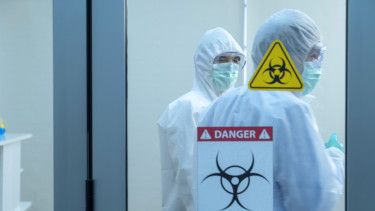Rising number of children with COVID-19 need medical care in Hungary - Zacher

Vaccination campaign should start right now
I don’t understand why they have to wait with the vaccination campaign until the end of November. Why haven’t we started vaccinations yesterday or today?
This was Gábor Zacher’s response when asked about the one-week vaccination campaign to be held between 22 and 28 November for anyone wanting to be inoculated against coronavirus without prior online registration.
He underlined that those that get their first jab by then will have built appropriate immunity by Christmas, while the ‘fourth wave’ is currently expected to peak in early December therefore it would still claim many lives. The physician reminded that the cabinet had been communicating for months that there is an ample stock of COVID-19 vaccines at hand, so this is not issue of a successful vaccination campaign.
Children in hospital
Zacher said there is no doubt that the epidemiological situation has been worsening week by week. Although hospitals are still coping, he said
it would be advisable to supplement the vaccination campaign with a wider-scale use of face masks, and by requiring immunity by vaccination at public events.
"At the same time last year, the coronavirus pandemic had claimed almost exactly as many lives as in the currently accelerating fourth wave. Hungary is ranked too high in the number of COVID-19 deaths per one million population in the world,” he said.
Zacher highlighted that those that have not received any COVID-19 vaccine are most at risk. And not just the 300,000-strong population of elderly people that received no jabs, but younger people too.
In the ‘fourth ‘wave’, not only an increasing number of people in their 20s and 30s get hospitalised with SARS-CoV-2, but more and more children need medical attention due to their coronavirus infection, he said. This happened only sporadically in the third wave, but it is much more common now.
The U.S. Center for Disease Control and Prevention (CDC ) has green-lighted a recommendation by a CDC advisory panel that children 5 to 11 years old be vaccinated against COVID-19 with the Pfizer-BioNTech paediatric vaccine. The Food and Drug Administration (FDA) had already authorised the shots for this age group. The doses are just a third of the amount given to teens and adults.
Zacher said “it would not hurt to start an information campaign in this respect in Hungary too, so when the shots [for this age group] are authorised by European authorities, Hungarian parents would also have this option.”
Vaccines do not protect you 100%
Whereas it is still true that one in every eight or nine COVID-19 patients in intensive care units is vaccinated, Zacher stressed that most of them have some underlying disease.
Vaccines do not give you 100% protection, but radically lower the risks of a severe disease or death
, he underlined.
Restrictions
“Vaccination, masks, washing hands, social distancing, and stricter event organisation rules. These tools should be employed by the government simultaneously, it should not bet exclusively on vaccination,” stressed Zacher.
He would make mask-wearing compulsory not only in public transport (as it is since 1 Nov), but also indoors in general. He also urges access to public events be conditional to having an immunity certificate.
“Immunity should be announced no sooner than 14 days after the second dose. Before that no one should be allowed to enter an indoor venue of any public event, e.g. the cinema or a concert. This measure would give a boost to the willingness to get vaccinated,” said Zacher.
As regards the reasons for mask wearing he recommends this video for viewing, so you can see how well protected you are with and without a face mask.
Zacher agrees with Prime Minister Viktor Orbán that the country could not cope with a lockdown it had last year, and that is exactly why he argues in favour of anti-pandemic measures other than vaccines be deployed at the same time.
Cover photo: MTI/Balogh Zoltán







